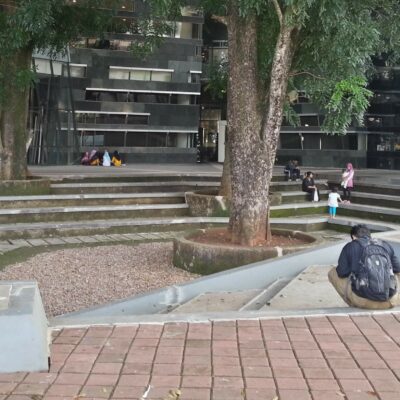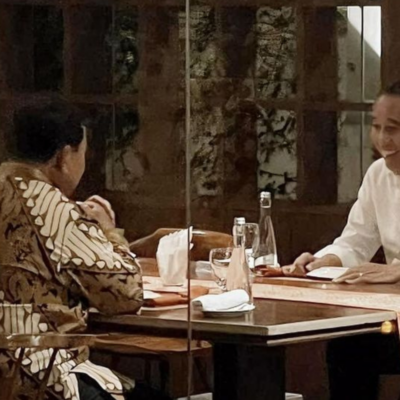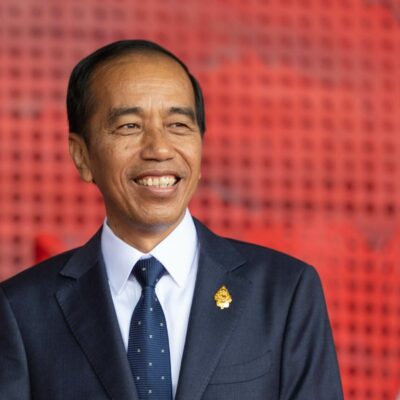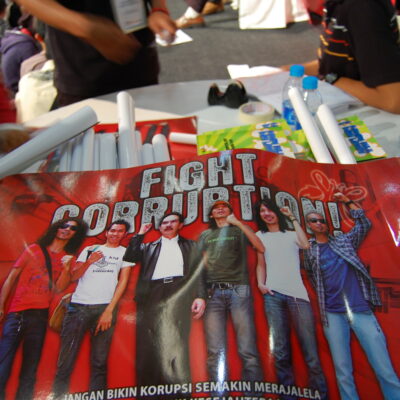In a meeting with social media influencers in Manado, North Sulawesi, on 24 December, vice-presidential candidate Gibran Rakabuming Raka encouraged Indonesia’s youth to demonstrate their leadership potential by seeking roles at all levels of government, local and national.
His appeal for political engagement was pitched at a key demographic in this year’s presidential election. According to the 2020 national census, Generation Z and Millennials account for 27.94 percent and 25.87 percent of the population respectively.
In electoral terms, this translates into a predominance of voters under 40 years of age, who comprise about 52 percent of the electorate or around 108 million people. Those aged 17 to 30 – who are too young to have any recollection of authoritarian rule – are especially influential, making up 31.23 percent of the total.
With the outcome of the first-round of presidential voting on 14 February likely to be significantly influenced by young and first-time voters, there is cynicism about the context of Gibran’s remarks, if not the content. As the youngest vice-presidential candidate in Indonesian history, Gibran positions himself as the embodiment of youth aspiration, bringing an image of freshness and vitality to the ticket he shares with the old warrior of Indonesian politics, Prabowo Subianto, 72.
But there is nothing typical about Gibran or his political rise. The vice-presidential candidacy of the 36-year-old eldest son of President Joko Widodo (Jokowi) began controversially. For Gibran to run in the elections it was necessary to rewrite rules that imposed a minimum age of 40 on presidential and vice-presidential candidates.
This required a ruling by the Constitutional Court, whose chief judge, Anwar Usman, happened to be Jokowi’s brother-in-law and Gibran’s uncle. The Court’s ruling on 16 October offered a neat solution: the minimum candidate age was confirmed, except for those who had previously held regional elected office in roles such as governors or mayors. Gibran had followed in his father’s footsteps by becoming mayor of Surakarta in Central Java in 2021. It should be noted, the constitution imposes no maximum or minimum age limits on candidates and electoral law previously had set the minimum at 35.
Still, the role of Gibran’s uncle in the Constitutional Court ruling predictably sparked accusations of a conflict of interest. Anwar was demoted to be an ordinary member of the bench after a review of the decision by a court ethics panel. Jokowi too faced accusations he was intent on building a dynasty.
Despite Jokowi’s enormous popularity (polls gave him an extraordinary 76.2 percent popularity rating in January), many young voters feel uncomfortable about his style of intervention politics. He casts his role in promoting the Prabowo-Gibran ticket as simply a case of being ‘hands on’ in seeing through his agenda, captured in his use of the Javanese term politik cawe-cawe. Thousands of university students recently took to the streets to reject Jokowi’s dynastic ambitions. They are also uneasy about Prabowo’s past – the retired Army Special Forces general faces unresolved allegations of serious violations of human rights, especially in relation to violence surrounding the downfall in 1998 of his former father-in-law, the late president Suharto.
Gibran has been labelled in Indonesian as anak haram konstitusi, literally the “illegtimate child of the constitution”. The disenchantment with the state of politics this reflects could be deeply damaging for the future of Indonesian democracy. Critics warn a victory for the “Jokowi dynasty” in the elections would mean the defeat of democracy.
In the eyes of many young voters, Gibran is already handicapped – tainted by the process of a political ascendency that was determined by family connections. He faces questions of trust and integrity. Yet if he does become Indonesia’s youngest vice president on inauguration next October, it will be important for him to demonstrate to new voters, and the Alpha generation to follow, that he can step out from his father’s shadow, be a political innovator and uphold the principles of democracy. Most importantly, he needs to go beyond relying on a youthful appearance and address the real concerns of young voters from jobs to the environment.
Gibran faces a testing apprenticeship because–make no mistake–his real goal is to follow Prabowo as president.
Young voters are often more receptive to change, progressive ideas, and social reforms, making them a driving force for political innovation and transformation. In the digital age, their engagement with technology and social media has a profound impact on shaping public discourse and spreading campaign messages. It should be noted, Indonesia has one of the highest penetration rates of social media in the world – 60 percent of its population. Indonesian youth are adept at using technology to mobilise support, share information, and raise awareness about political issues. Their capacity to swiftly amplify messages and connect with their peers is a powerful tool in modern political campaigning. Candidates who can effectively engage with young voters and address their concerns have a clear electoral advantage.
In order to resonate with young voters, all candidates and political parties in the Indonesian elections have employed dynamic and tech-smart campaign strategies that reflect youth values and concerns. Utilising social media platforms, such as Instagram, X (Twitter), and TikTok, to engage with voters on a personal level has been instrumental in creating a relatable image. Prabowo, for instance, uses TikTok to perform and circulate a dancing style, popularly called gemoy, involving swaying hips and waving arms. Gemoy promotes a loveable image of Prabowo as a “harmless grandpa”. The social media pitches and the hokey advertising seem targeted especially at the youth vote.
Rival presidential candidate Anies Baswedan, 54, applies a different approach, employing conversation sessions–called Desak Anies (literally “Demand Anies”)–with Gen Z and Millennials. These Q&A sessions, starting with stand up comedy by young people, have been conducted by Anies from the first day of campaigning. This style suits Anies’s background as an academic and former minister of education and culture. A range of topics have been discussed during his interactions with young Indonesians ranging from food prices to education costs, the state of the economy, human rights and governance.
Ganjar Pranowo, who was the early frontrunner for president before Jokowi effectively endorsed Prabowo with the selection of Gibran as running mate, once observed that many young voters are not interested in the vision and mission statements of presidential candidates. Of the three candidates, it is Ganjar who most seeks to harness physical appeal and personal style to capture the hearts of young voters. Although silver-haired at 55, he retains boyish looks and appears for the cameras sporting bomber jackets and making hip hand gestures.
All three campaigns risk underestimating youth political savvy and long-term aspirations. As with the student activism that supported the rise of Reformasi in 1998, Indonesia’s youth have re-emerged as a powerful political force. These voices, diverse in their backgrounds and experiences, seek change, innovation, and progress. With an acute sense of social awareness – and a level of internet-enabled connectivity that their predcessors lacked – the current generation of young are well placed to play a pivotal role in influencing political discourse, challenging the status quo, and ultimately, shaping the outcome of future elections. This surge of youth activism and advocacy underscores the potential to transform a national politics that has been marred by the persistence of corruption, collusion, and nepotism (KKN) – the very slogan that energised the protests of the 1998 generation. Ironically, many of those staffing the current campaigns, including Prabowo’s, hail from that earlier generation.
Today, Indonesian youth grapple with many of the same significant challenges that confronted their forebears, including limited access to quality education and employment opportunities, generating anxieties about future security. Economic disparities persist. But mental health too is gaining prominence amid the pressures of modern life and societal expectations. And environmental concerns, such as deforestation, pollution and rivers running dry, are increasingly a source of fear about the future.
These are issues that are likely to animate youth voting in the 14 February presidential and parliamentary elections – and a second round presidential election on 26 June, if necessary. None of the campaigns have addressed them in substance.
While a high turnout of youth voters is likely, it should not be mistaken for endorsement. Indonesia’s youth will expect more than slick candidate branding. Gibran, as the likely next vice-president, would leave his mark and secure his own political future only by demonstrating he understands youth concerns and is more than just the President’s son.
Justin Wejak is a lecturer with the Asia Institute at the University of Melbourne.
This article is part of a special co-published series on the Indonesian election led by Asialink’s Insights.
Image: Gibran Rakabuming Raka reaching out to a crowd, Kebumen, January 2024. Credit: @gibran_tweet.




